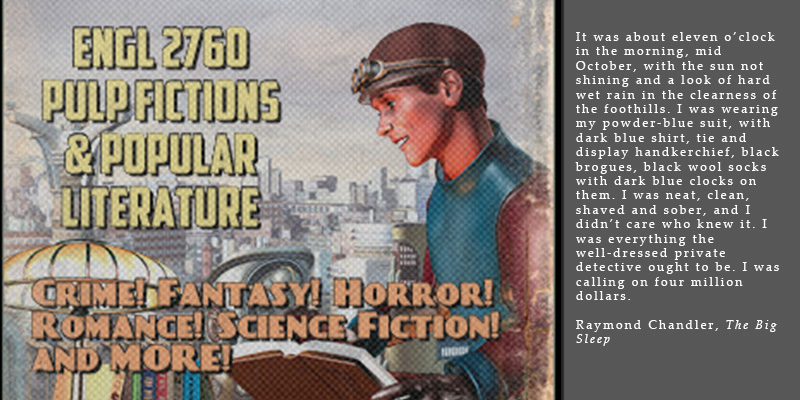Catalog Description
Study of popular literature written in established genres such as crime, fantasy, horror, romance, science fiction, and western. GE C2
Course Description
While the origins of the novel in English date back to the seventeenth century, it was not until the second half of the nineteenth century that the form shed its reputation as light and juvenile entertainment and began to be taken seriously as an artistic expression and as an important indicator of the producing and consuming culture’s values and anxieties. Genre fiction—short stories and novels written in popular genres such as crime, fantasy, horror, romance, science fiction, and western—seems to be undergoing a similar transformation from light, low, and immature to texts worthy of our thought and study. This course theorizes the central idea of genre—a series of conventions that can govern the world-making possibilities of a text but which are just as often violated in service of a writer’s purpose—and draws attention both to the craft of the form and the interpretive possibilities they produce. Popular fiction is popular for a reason. Like the novel before it, genre fiction both reflects and produces the culture that produces and consumes it.
For students, the course provides a critical perspective on their own tastes and values, and a theoretical basis for their aesthetic and economic choices. Furthermore, because genre fiction with its roots in myth, legend and folklore takes as its subject power relations and much contemporary genre fiction is interested in representing non-traditional, marginalized, and minority perspectives, this course will help students recognize social, political, and cultural negotiations over power as played out in products of mass appeal.
Learning Outcomes
Upon completion of this course, students will be able to:
- Understand the history and development of genres of popular literature;
- Identify the structural elements of popular genres;
- Recognize major authors in various genres;
- Understand basic literary elements such as plot, scene, setting, and characterization as they apply to various popular genres;
- Read and interpret selected novels and stories, discuss major themes and issues, and apply insights gained through such reading to developments in our own society;
- Apply reading theory and critical theory to the issues raised by these selected stories and novels;
- Connect themes and characters in popular fiction to their origins in myth, legends, and traditional literary works;
- Demonstrate the above abilities in tests, quizzes and informal and formal writing assignments;
- Cultivate a life-long enjoyment of popular fiction.
Course Outline
Course content might be organized in a number of ways. Listed below is one common method of organizing a genre survey course.
Chronological Structure
Week 1—Introduction to genre fiction; reading conventions, history of popular fiction
Weeks 2-5—Detective and Crime fiction
Week 6—Myth, legend, and the origins of fantasy
Weeks 7-10—Fantasy fiction
Week 11—Origins and conventions of science fiction
Weeks 12-15—Science fiction
About the Banner: Custom illustration created using Pulp-o-Mizer (http://thrilling-tales.webomator.com/derange-o-lab/pulp-o-mizer/pulp-o-mizer.html)
